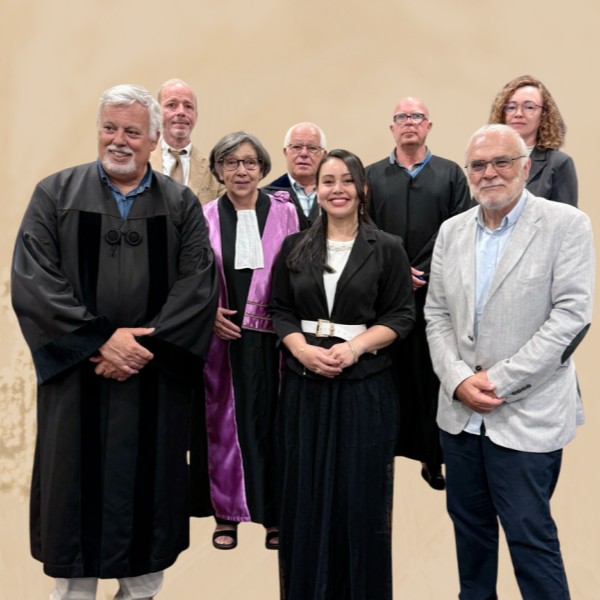
Researcher defends PhD thesis on online educational communities
Research reveals innovative strategies for creating and sustaining meaningful digital learning communities
Sustainable Development Goals (SDG)

Walline Alves Guimarães, a doctoral researcher at CeiED, defended, on 22 July, at Lusófona University - Lisbon University Centre, her PhD thesis in Education, with a focus on Communication and Education. The study investigates how online educational communities are constituted in the digital environment and which communicational and pedagogical strategies favour their effective construction and sustainability.
Entitled “Education and Communication in the Digital Era: Strategies and Challenges for the Construction of Online Educational Communities”, the research is based on the premise that developing meaningful online educational communities requires more than the use of technologies: it demands ethical commitment, pedagogical intentionality, and communication and engagement strategies that break away from the logic of distraction and consumption that dominates social media.
The aim of this research was to analyse the elements and strategies of communication, education, and sociability present in social networks and online education communities, with the objective of outlining guidelines for the creation of a digital educational community that serves as a basis for teachers and scientists, promoting innovation in forms of knowledge transmission and the dissemination of scientific knowledge.
The study followed a predominantly qualitative paradigm, complemented by quantitative analyses of data extracted from digital social networks. Regarding research procedures, the nature of the study was netnographic. This research model is specifically designed to study digital cultures and communities.
The researcher analysed the role of teachers and digital influencers in the formation of learning ecosystems on Instagram and YouTube. Teachers were selected based on criteria such as the relevance of their activities and their achievement of significant national and international awards in the field of education, in Brazil, Portugal, and England.
In the first phase of the study, where the netnographic research took place, the researcher analysed content, comments, and audience reactions from a sample of 2,374 posts. In addition, she carried out four interview analyses, conducted at the level of structural deciphering focused on each interview. The second phase of the research was dedicated to the creation of a framework with essential factors across dimensions and practical actions to facilitate the creation and maintenance of online educational communities, as well as a survey of teachers and scientists from the State of Maranhão, her hometown, who act as disseminators of education and science on digital social networks, and their respective areas of teaching and research.
“Studying these elements and strategies of communication and education was fundamental to understanding current trends and shaping the future of the dissemination of education and science in a digital world, building bridges between experts and society at large”, states Walline Guimarães.
The researcher further emphasises, through the study, that digital influence is directly related to the construction of social capital and the development of genuine connections. “Effective and human-centred educational and scientific communication is essential to engage diverse audiences, strengthen communities, and democratise knowledge,” she said. However, Walline also asserts that the study highlights significant challenges related to algorithmic control and dependence on commercial platforms.
In the digital era, educating and communicating implies understanding that we are embedded in a market logic where people’s attention is constantly fragmented and continuously contested. Digital platforms, while expanding access to knowledge, operate under models that value retention time and engagement as commercial assets. Walline ultimately considers that the digital era has expanded the possibilities of educational monetisation, transforming educators into potential entrepreneurs, whether by choice or for the sustainability of online educational communities.
The thesis highlights that, beyond tools, what sustains an online educational community is the continuous construction of bonds, trust, relevance, and collective purpose.
The research contributions engage with the fields of digital communication, education, and network culture, offering theoretical and practical support to those who wish to transform digital environments into real spaces of learning, social relationships, and knowledge exchange. “Education on networks cannot simply be an extension of traditional teaching. It is necessary to understand the codes, emotions, and dynamics of social media in order to educate in a truly meaningful way”, affirms the author.
The thesis was supervised by Professor Doctor Vítor Duarte Teodoro and defended within the doctoral programme in Education at Lusófona University. The study was approved with distinction and honours by the jury.










